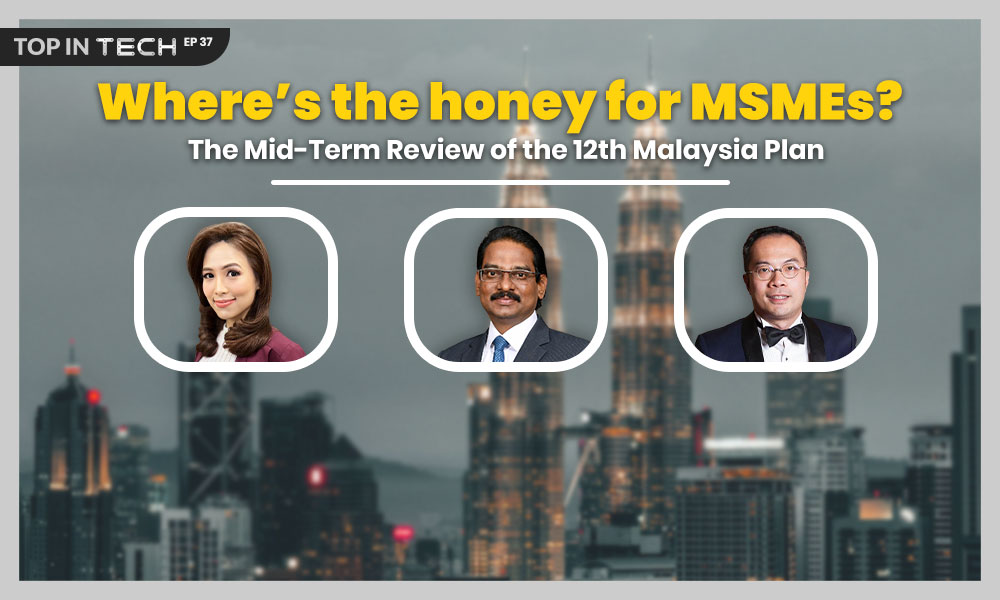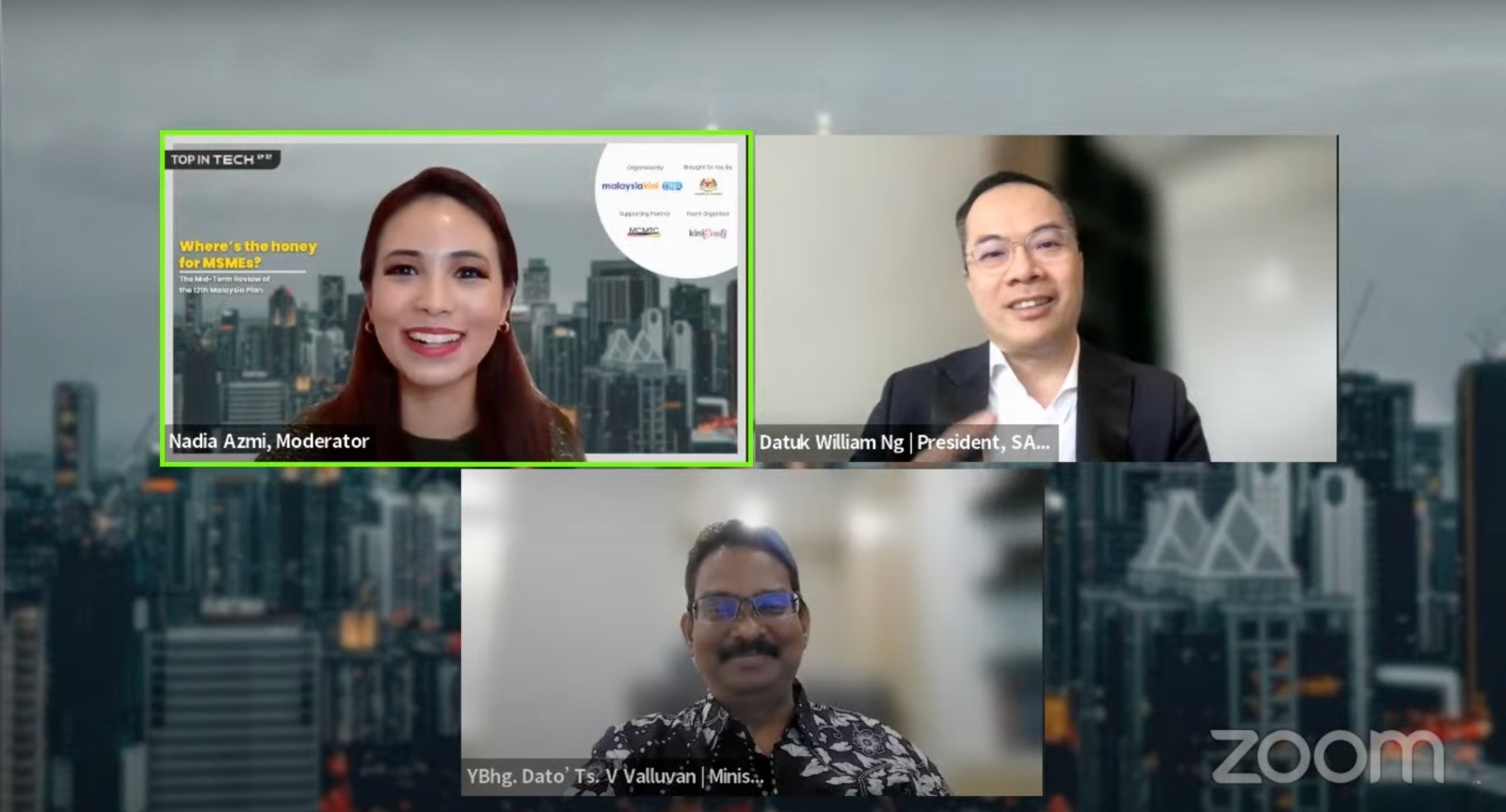
In this episode, we thoroughly explored the invaluable insights and expert guidance provided by industry professionals and esteemed government officials. They will shed light on the myriad ways in which Micro, Small, and Medium Enterprises (MSMEs) can harness the opportunities presented by the 12th Malaysia Plan (12MP) to substantially bolster their competitive edge and fortify their resilience within the ever-evolving global market landscape.
Empowering Malaysia's MSMEs Through the 12th Malaysia Plan: Approaches and Opportunities
The discussion commenced with YBhg. Dato’ Ts. V Valluvan Veloo, from the Manufacturing Industry, Science and Technology Division of the Ministry of Economy, taking the lead, moderated by Nadia Azmi. Dato’ Ts. V Valluvan Veloo highlighted the significant departure that the 12-year midterm review of the Malaysia Plan represents, emphasizing its seven ambitious goals and actions aimed at ensuring the realization of set targets. Notably, one of these key goals centers on Micro, Small, and Medium Enterprises (MSMEs), recognized as the bedrock of the nation's economy.
The conversation then shifted to the second speaker, YBhg. Datuk William Ng, the National President of the Small and Medium Enterprises Association (SAMENTA). Datuk William delved into the challenges posed by the pandemic and the dynamic economic changes it has spurred. He underscored the imperative of a midterm review, especially in light of the rapid rise of nationalism, emphasizing its pivotal role in shaping economic strategies.
Enhancing Access to SME Grants; Challenges and Strategies
During the discussion, Nadia Azmi relayed a question from the audience, inquiring about the challenges associated with applying for and receiving SME grants. In response, Datuk William suggested that transitioning into core financing mechanisms, such as offering low-interest loans, could facilitate the process. He also emphasized the importance of government intervention through credit guarantees. From the MSME perspective, he proposed building resilience and widening the utilization of grants through interest rate subsidies.
Dato’ Ts. V Valluvan Veloo added to the conversation by underlining the critical role of the midterm review in promoting alternative financing methods. He mentioned that the government is committed to providing funding, grants, loans, and returns on investment, even if it takes time. Ensuring that the structure of MSMEs remains intact throughout the bureaucratic process and evaluating whether the funds allocated to industries and companies yield a multiplier effect are essential considerations in this endeavor.
Defining Serious MSMEs and Promoting ESG Sustainability
The next question in the discussion revolved around the definition of "serious MSMEs." Dato’ Ts. V Valluvan Veloo responded by emphasizing the importance of providing support for digitalization efforts, and Nadia further elaborated on the implementation of Environmental, Social, and Governance (ESG) agendas, particularly highlighting sustainability concerns. Dato’ Vallu stressed the significance of raising awareness and incorporating the ESG agenda, recognizing it as one of the viable approaches. In light of this, it is crucial to identify which companies and sectors can effectively meet these criteria, focusing on aspects such as social impact, employee salaries, workforce conditions, and funding.
Datuk William, representing SAMENTA, also discussed the ESG perspective, shedding light on issues related to carbon emissions, machinery, and strategies for survival. He highlighted SAMENTA's past efforts, including the employment of OKU (Orang Kurang Upaya) workers, and mentioned the recently launched IESG program; “This program aims to empower small retailers, enabling them to embrace the digital economy and enhance their productivity. It is essential for the government to recognize that the majority of SMEs operate in the service sector, extending beyond manufacturing, and tailor its policies accordingly”
Continuing the discussion, Dato’ Ts. V Valluvan Veloo delved into the topic of alternative financing and proposed the idea of providing subsidized loans. This would involve the government subsidizing interest rates, ultimately making it more feasible for SMEs to access financing. He emphasized the necessity of fostering greater engagement between SMEs and relevant agencies to ensure their readiness for such initiatives. Additionally, in the context of Environmental, Social, and Governance (ESG) concerns, Dato’ Vallu highlighted the need for more immediate action, suggesting that government intervention is crucial to prevent potential adverse effects on the entire nation.
Fostering MSME Expansion into New Sectors and Enhancing Opportunities
The discussion turned to the accessibility of MSMEs to venture into specific sectors. Dato’ Vallu emphasized the need for a broader agenda, highlighting the growth potential in digital and technology sectors with high industry value. He urged MSMEs to seize these opportunities, especially considering the readiness outlined in the midterm review. He stressed the importance of preparation, such as adopting high-tech packaging practices, and encouraged MSMEs to collaborate through associations like SAMENTA to collectively work towards achieving Key Performance Indicators (KPIs) for sustainable growth.

In the closing question of the day, Nadia directed her inquiry to Datuk William, touching upon the strategies to encourage more MSMEs to hire B40 women from rural areas, particularly those who may not be tech-savvy. Datuk William discussed the necessity of training these individuals from the ground up and mentioned the importance of grants to support this initiative. He also acknowledged the government's focus on rural entrepreneurs and initiatives to encourage women, including housewives, to enter the workforce. To facilitate this, he proposed a co-sponsoring approach where the government and SMEs jointly contribute to support these initiatives, sharing the responsibility and benefits. In essence, this approach aligns with the principles of social inclusion and the goals of an inclusive economy, as outlined in the concept of "Economi Madani"
Watch Top In Tech Ep37: Where’s the honey for MSMEs? - The Mid-Term Review of the 12th Malaysia Plan - HERE



